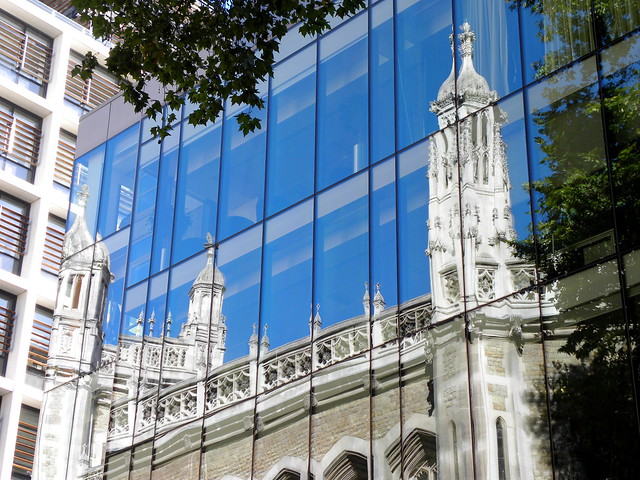
Building Reflective Communities
I know people who seem to assume being part of a monastic community is like being at church all the time. This is not a prospect which they tend to find attractive.
Their experience of being at church is often one of other people telling them what to believe or how to live. They have not found churches to be places where their questions are welcome.
In their experience churches are like foreign countries where people speak a different language. They are not countries known for their openness to strangers. Many people find churches to be like countries which restrict how often people can visit with special rules and expectations.
Some of them even have rules about what people can wear.
These are not the aspects of churches, or monastic communities, which we find attractive.
There are two things which draw me to churches and to monastic life. First is the way they value stillness. I love sitting in an empty church praying and listening to how people have prayed there throughout their history.
Second is how they nurture reflective conversations. While I could live without making small talk for the rest of my life, reflective communities spark the fire in my heart.
The churches and monasteries which have shaped me have been places of reflective conversation. Their focus is not on telling everyone the right answers they have found. They have not believed they had a monopoly on the truth.
Many reflective communities get started and keep growing as they ask questions together. They do not exist to defend the truths they hold dear, but to explore together and discover deeper truths.
We need reflective communities to help us discover what we believe for ourselves, not whether we have learned what someone else has tried to teach us.
Reflective Communities Help Us Understand
I do not remember a monk ever trying to tell me what to believe or how to live my life. The monks I know seem to be better at asking questions than at forcing answers on people. They build reflective communities and, when people come to them with questions, they encourage them to listen and reflect.
The monasteries I know best, where I am most comfortable, are not particularly hierarchical places. Monastic days include time for reflection and listening.
As my own spirituality has become more contemplative I have grown into reflective communities.
Each of us learns to discern for ourselves and we find reflective communities in which we can participate. Some of us have regular conversations about spiritual life with people we trust. Other people become connected to book groups or knitting circles or other organizations. We need people and places in our lives where we can reflect. Without reflective communities we lose track of who we are and where we are trying to go.
Each of us needs to take time for reflection. Those of us who feel the busiest probably need reflection the most.
Many of us have little or no experience with reflection. We have been taught to approach life analytically for our entire lives and reflection feels like a foreign concept.
The idea of reflective communities probably makes us uncomfortable. Extroverts are nervous about the concept of reflection which introverts feel anxious about the idea of a community.
We need a way to learn how to understand what reflection is and how we can reflect.
It can be a challenge for us to find people who are as interested as we are in a reflective community. Not all of us are willing to drive to a monastery.
Reflective Communities Without Buildings
We live in a world where our search for the reflection we need is not limited by physical geography.
People can now build reflective communities which do not require buildings or transportation.
Many of us appreciate the ways the Internet helps us connect with people with whom we share values even though we have never met in person. Some of us have found or reconnected with close friends through social media. We find people and form reflective communities over long distances.
Our lives online can help us build communities to tap into resources which enhance our everyday lives.
How can we live our lives both in person and online to become more open to spiritual life? Can an online reflective community help us experience the reflection for which we thirst?
We can create online reflective communities and nurture reflective conversations.
Building Online Reflective Communities
I am building a reflective community online, and invite you to join me.
We are following a program called Education for Ministry(EfM) which is overseen by the University of the South in Sewanee, Tennessee. It consists of four sessions, each of which lasts for a nine-month academic year.
Together with a small group of other people online, we discover and explore our story and how we apply it in everyday life. Through reading, prayer, and reflection, we help each other move toward new understanding.
The approach of EfM is grounded in learning to practice reflecting theologically. Each session of the program focuses on a different topic. The conversation of each group can include people from all four of the years each week.
As we talk about what we read and experience each week, metaphors emerge. Each week builds on the last just as each annual session leads into the next one. Our conversation draws meaning out of each week’s events and reading. Part of our process is to notice questions and insights which guide our application of what we see.
EfM has been a significant step for my own theological reflection. Each year’s reading, reflection, and conversation has opened doors for me.
The program provides a framework to include reading, reflection, and conversation in my schedule. It helps me bring together contemplative reflection and analytical inquiry in my own life.
Reflecting theologically has become a central aspect of my understanding of spiritual life.
Please join me in building online reflective communities.
[Image by Rev Stan]
Greg Richardson is a spiritual life mentor and coach in Southern California. He is a recovering attorney and a lay Oblate with New Camaldoli Hermitage near Big Sur, California. Greg’s website is StrategicMonk.com and his email address is [email protected].












